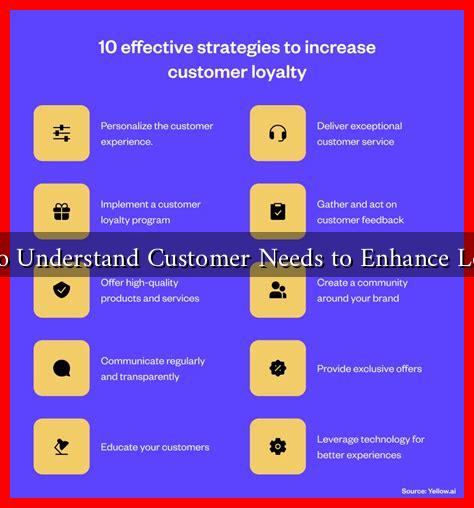-
Table of Contents
How to Understand Customer Needs to Enhance Loyalty
In today’s competitive marketplace, understanding customer needs is paramount for businesses aiming to enhance customer loyalty. Loyal customers not only contribute to a steady revenue stream but also act as brand ambassadors, promoting the business through word-of-mouth. This article explores effective strategies to understand customer needs and how these insights can be leveraged to foster loyalty.
The Importance of Understanding Customer Needs
Understanding customer needs goes beyond merely collecting feedback; it involves a deep dive into the motivations, preferences, and pain points of customers. According to a study by Forbes, companies that prioritize customer experience can see a revenue increase of up to 80%. This statistic underscores the importance of aligning products and services with customer expectations.
Strategies to Understand Customer Needs
To effectively understand customer needs, businesses can employ several strategies:
- Conduct Surveys and Interviews: Regularly engage with customers through surveys and interviews to gather direct feedback. Tools like SurveyMonkey or Google Forms can facilitate this process.
- Utilize Social Media Listening: Monitor social media platforms to gauge customer sentiment and identify trends. Tools like Hootsuite or Brandwatch can help track mentions and discussions about your brand.
- Analyze Customer Data: Leverage analytics tools to examine purchasing patterns, preferences, and behaviors. Platforms like Google Analytics can provide valuable insights into customer interactions.
- Implement Customer Journey Mapping: Create a visual representation of the customer journey to identify touchpoints and areas for improvement. This helps in understanding how customers interact with your brand at various stages.
Case Studies: Brands that Excel in Understanding Customer Needs
Several brands have successfully implemented strategies to understand customer needs, resulting in enhanced loyalty:
- Amazon: Amazon uses sophisticated algorithms to analyze customer behavior and preferences, offering personalized recommendations. This approach has significantly contributed to its customer loyalty, with Prime members spending more than non-members.
- Starbucks: Starbucks employs a mobile app that allows customers to customize their orders and earn rewards. By understanding customer preferences through the app, Starbucks has fostered a loyal customer base that frequently engages with the brand.
- Zappos: Known for its exceptional customer service, Zappos encourages employees to go above and beyond to meet customer needs. Their commitment to understanding and addressing customer concerns has resulted in high levels of customer satisfaction and loyalty.
Leveraging Customer Insights to Enhance Loyalty
Once businesses have gathered insights into customer needs, the next step is to leverage this information effectively:
- Personalization: Tailor marketing messages and product offerings based on customer preferences. Personalized experiences can significantly enhance customer satisfaction and loyalty.
- Improve Customer Service: Use feedback to identify areas for improvement in customer service. Training staff to address common pain points can lead to a more positive customer experience.
- Develop Loyalty Programs: Create loyalty programs that reward customers for repeat purchases. Programs that offer personalized rewards based on customer preferences can be particularly effective.
- Engage Customers: Foster a community around your brand by engaging customers through social media, newsletters, and events. This creates a sense of belonging and encourages loyalty.
Conclusion
Understanding customer needs is a critical component of building and maintaining customer loyalty. By employing strategies such as surveys, social media listening, and data analysis, businesses can gain valuable insights into their customers’ preferences and pain points. Successful brands like Amazon, Starbucks, and Zappos demonstrate the power of leveraging these insights to create personalized experiences that foster loyalty. In a world where customer expectations are continually evolving, prioritizing the understanding of customer needs is not just beneficial; it is essential for long-term success.

